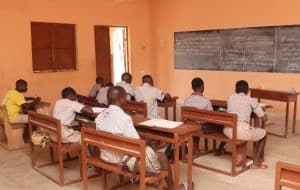In the heart of Africa, Ghana’s vibrant communities strive to overcome their challenges. Among them is Karaga, home to the Karaga LA Junior High School (JHS), the only school in the area. Unfortunately, the school’s deteriorated condition created a chaotic learning environment for the children of Nchibadu, Njambado, Nadudo, Sibruni, and Karaga.
The school, made of mud and topped with a thatch roof, attracted lizards, cockroaches, and various insects. Students in the JHS classrooms endured disruptive encounters with unwanted visitors, such as snakes, which hindered their education. When rain poured, classes were cancelled as there were no doors or windows to shield them. It was a struggle to concentrate.

iRCWG standing in front of the renovated classroom block.
In 2020, Karaga became part of the ground-breaking 4R Nutrient Stewardship project, which is a partnership between the Co-operative Development Foundation of Canada, Fertilizer Canada, and Global Affairs Canada. This initiative organized farming families into co-operative groups, including the Rural Commercial Women Group, which empowered women through small businesses. The project provided training on co-operative principles, financial management and literacy, strengthening co-operatives, and creating market and business opportunities for women. The community felt a glimmer of hope.
But the challenges persisted at the school. Students lost interest, some even dropped out of school, and others embarked on a five-mile journey to the nearest school in Bimbilla. Desperation filled the hearts of parents.
At this critical moment, the Rural Commercial Women Group came together. They used their savings from the sheanut business and contributions earned through farm labour to replace the thatch roof with sturdy materials like zinc and wood. This transformation brought peace to the classrooms in 2020 since the nightmare of battling snakes and lizards was dealt with.
The men in the co-operative also joined forces, refurbishing the mud structure, and lending a hand in the transformation. Their collective efforts caught the attention of the government’s education services (GES).
In 2022, the government responded with action. They constructed a three-classroom block for Karaga LA JHS, bringing joy to the community. The headmaster praised the Rural Commercial

A cross-section of pupils in JHS 2 in a sound class.
Women Group and the co-operative for their tireless efforts. Their unwavering commitment brought tangible change to their community and surrounding communities.
With improved facilities, the school attracted more students. Pupils in JHS 2 and JHS 3 increased, breathing new life into the school that once had dwindling attendance. Hope blossomed within the school’s walls.
Sustainable co-operatives, and groups like the Rural Commercial Women Group, embody the spirit of transformation in Ghana’s communities. They identify local challenges, mobilize resources, and take bold steps to find solutions. Through their determination, a renewed wave of educational opportunities is reaching the children of Nchibadu, Njambado, Nadudo, Sibruni, and Karaga.
Co-operatives have become catalysts for change, nurturing a brighter future for communities across Ghana. Your support can help unleash the potential of these co-operatives, allowing them to continue transforming lives through education. Together, we can make a difference.